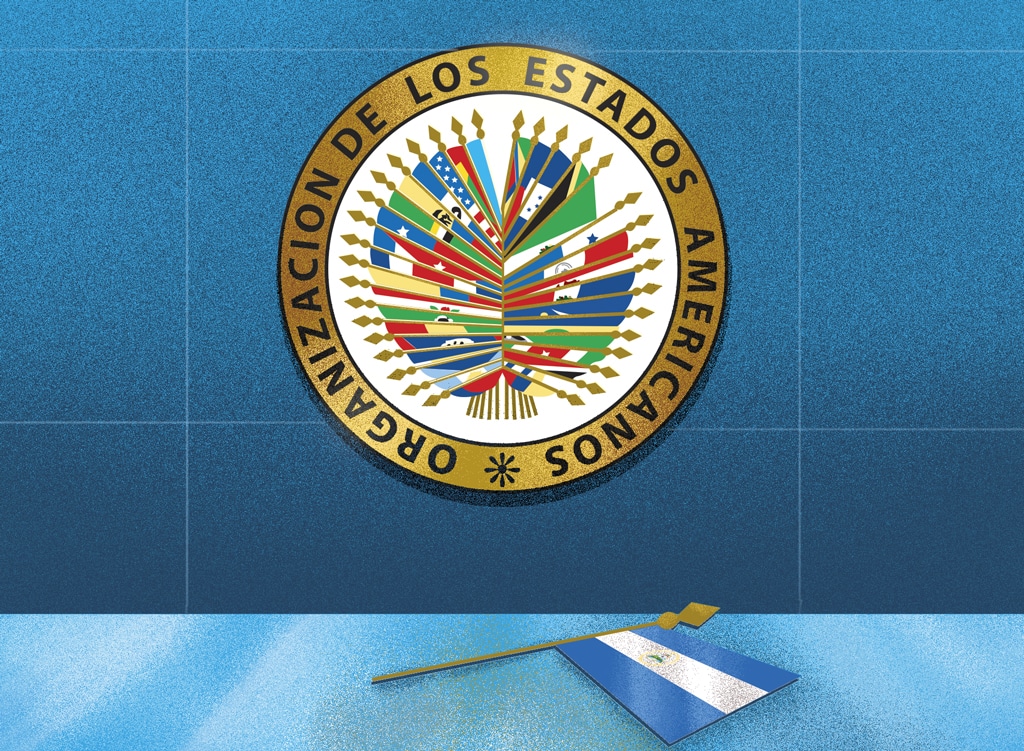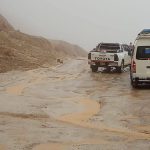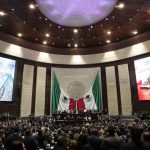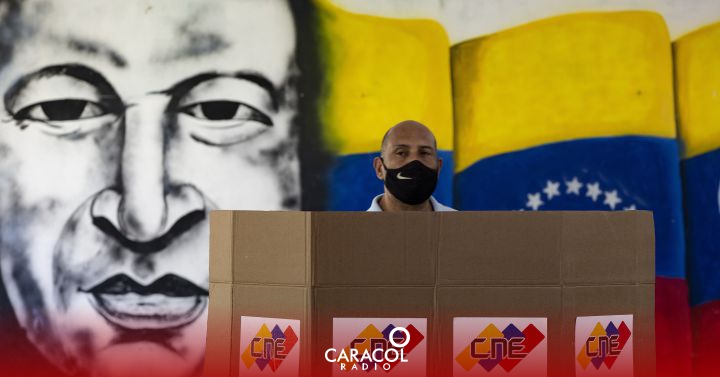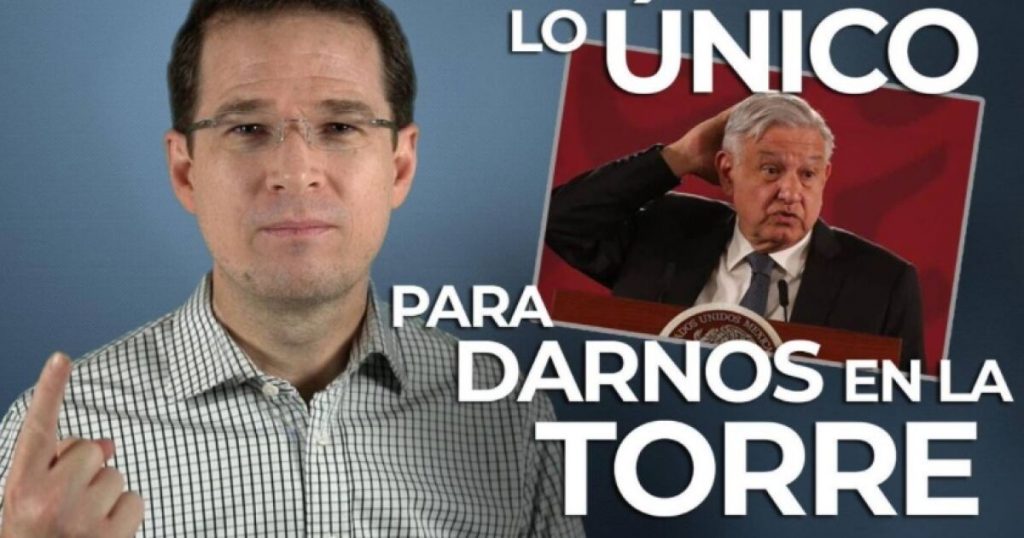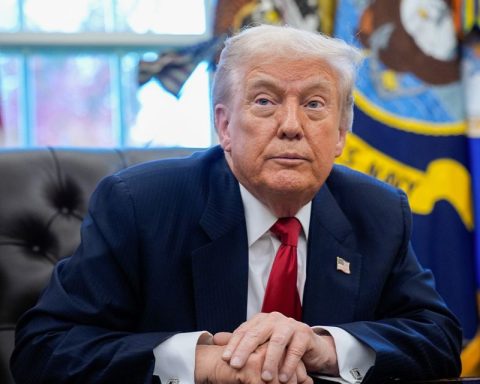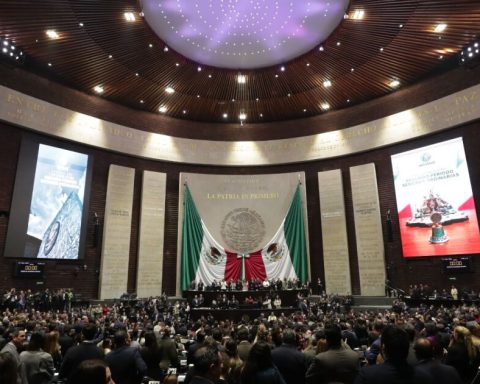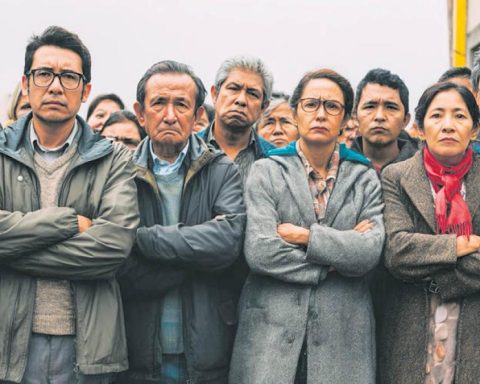The start of the exit process from the Organization of American States (OAS) by Nicaragua is not directly linked to future decisions made by multilateral financing organizations, but it is a variable that will be taken into account when approving new loans or other financing mechanisms for the country, according to consultations made to former diplomats by CONFIDENTIAL.
This Friday, Foreign Minister Denis Moncada Colindres, before a battery of journalists from the regime’s propaganda, announced that a letter was sent to the Secretary General of the OAS, Luis Almagro, in which it was reported that the regime of Daniel Ortega and Rosario Murillo began the Nicaraguan withdrawal process of the regional body.
“Instructed by the constitutional president of Nicaragua, Commander Daniel Ortega Saavedra and in compliance with Article 67 of the Vienna Convention on the Law of Treaties, I am writing to you to officially notify you of our unwavering decision to denounce the Charter of the Organization of the American States, in accordance with its Article 143, which initiates Nicaragua’s definitive withdrawal and resignation from this organization, ”he cites the letter sent to Almagro, which was read by Moncada during his appearance.
The regime argued that the decision was made after all the powers of the State, subordinate to the dictatorship, requested Ortega to denounce the OAS Charter, by virtue of what is established in Article 143 of the instrument, and initiate the exit process of the organism.
This mechanism would culminate in two years, during which time Nicaragua maintains its rights and obligations according to the regulations of the regional body.
There will be considerations for approving loans
“The consequences of Nicaragua’s exit from the OAS in the multilateral financing organizations will not occur directly, because there is no legal link between one and the others, not even with the IDB (Inter-American Development Bank). But the denunciation of the OAS Charter is the consequence of a serious deterioration in the human rights situation and the illegitimacy of the November 7 elections, recognized and declared by 25 countries in the region, ”explained a former diplomat who asked not to be cited to avoid reprisals from the dictatorship.
“Among the borrowing and non-borrowing partners of these bodies and the members of their Governing Councils, there are many countries that have voted in favor of the resolutions of the Assembly and Permanent Council of the OAS or of the European Parliament and Council. Obviously, when it comes to approving the loans that Nicaragua requests, the considerations of these countries will weigh, ”he added.
He warned that, in fact, the loans of these organizations to Nicaragua had been frozen since April 2018, as a result of the bloody repression of civil protests against the regime, and it was only due to the health crisis derived from the pandemic by the covid-19, and the impact of hurricanes Iota and Eta, which approved emergency funds for humanitarian purposes.
Decision of the OAS Permanent Council will be key
He also mentioned that the decision of the OAS Permanent Council will have to be seen in the collective evaluation of the situation in Nicaragua that must be carried out before November 30, by mandate of the last General Assembly of foreign ministers of the organization.
In this General Assembly, the OAS approved – with 25 votes in favor, one against, seven abstentions, and one absence – a resolution that declared that the Nicaraguan votes on November 7 “They were not free, fair or transparent and they do not have democratic legitimacy.”
“If there is a decision on the suspension of Nicaragua in accordance with Article 21 of the Democratic Charter, the resolution could include a call to countries and international organizations to review their relations with the suspended country, as was done in the case of Honduras in 2009 ”, explained the former diplomat.
Experts on international issues indicated to CONFIDENTIAL that the announced withdrawal of the OAS will facilitate the decision of the countries to convene an extraordinary assembly of foreign ministers, where it will be determined whether or not to suspend Nicaragua, for which they already have the 24 votes necessary.
According to experts, the announcement of the regime will strengthen the position of the countries that have requested take action against the Ortega government, and show the “undecided” that “Nicaragua is not going to cooperate and therefore there is no dialogue to keep.”
Regime seeks to take pressure off
“More than buying time, it is about getting rid of a constant and growing pressure, which inflicts enormous political wear, both internally and externally. The problem is that it is mistakenly believed that the pressure will stop simply by denouncing the treaty and leaving the OAS. That by leaving the OAS, everyone will stop talking about Nicaragua, ”said the former diplomat.
Carlos Cascante Segura, professor at the School of International Relations of the National University (UNA), of Costa Rica, commented that the regime has set “the stage to leave the OAS”, but under “the letter of interventionism of the OAS” and the alleged “violation of national sovereignty.”
“In fact, the legal separation from the OAS will not occur until after two years have elapsed, but they will continue ‘the international instruments mentioned in article 46 of the Constitution, such as the Universal Declaration of Human Rights, are fully in force; the American Declaration of the Rights and Duties of Man; the International Covenant on Economic, Social and Cultural Rights and the International Covenant on Civil and Political Rights of the United Nations and the American Convention on Human Rights of the Organization of American States ”, he added.
The mere threat of Nicaragua being suspended from the OAS already implied problems with international financial organizations. Former Costa Rican President Luis Guillermo Solís told CONFIDENTIAL, in a previous interview, what a possible suspension resolution it could have “financial implications” for the country.
“If Nicaragua is suspended from the organization, it means that it will not be able to receive funds from CABEI (Central American Bank for Economic Integration) and eventually from the IDB (Inter-American Development Bank). That already places the sanctions on another level and if the Renacer Act (approved by the United States) is added to that, we are facing a completely new situation, ”said Solís.
In four and a half years, from January 2017 to June 2021, the Government of Nicaragua has received from CABEI more than 2,289 million dollars – an average of over 450 million dollars a year – despite criticism and demands for its funding to cease due to the violent repression of Ortega and the de facto police state that tramples on human rights.
CABEI has also granted 7.11 million dollars, from October 2017 to November 2020, in non-reimbursable funds for emergency aid due to the impact of hurricanes, sanitation programs and the fight against covid-19.
